Table of content
Introdution
Water retention, also known as fluid retention or edema, occurs when excess fluids build up in your body. This condition can lead to swelling in your hands, feet, and abdomen, and may even make you feel bloated or uncomfortable. High-sodium options, such as salty snacks, processed meats, and canned soups, often lead to fluid buildup in your body. Track changes with a blood pressure monitor to spot patterns in your symptoms. Water retention, or edema, occurs when excess fluid collects in tissues.
In clinical practice, edema is linked to sodium intake, which prompts the body to hold water for balance. The American Heart Association notes daily sodium limits at 2,300 mg, yet many exceed this through common foods. This article details the main offenders, backed by medical sources, and offers practical steps.
Key Symptoms of Water Retention Include:
- Swelling in extremities (hands, feet, ankles)
- Puffy face or eyelids
- Stiff joints or difficulty moving
- Sudden weight gain without changes in diet
Most Common Foods that Cause Water Retention
1. High-Sodium Foods
Sodium draws water into cells, increasing blood pressure and swelling. Patients with hypertension often experience edema after salty meals. If a person takes 1500 mg daily, the risk of water retention increases.
Salty Snacks
- Potato chips, pretzels, and salted nuts cause water retention. If you eat a single pack of potato chips, it contains 150-200mg of sodium
- It targets thirst, bloating, and ankle swelling.
- Cutting the sodium will often reduce swelling within the day
Real-world example: A patient with mild edema noticed ankle swelling after evening snacks. Cutting them reduced symptoms in days.
Processed Foods
- Frozen meals pack hidden sodium, up to 1,000 mg per portion. These convenience items disrupt electrolyte balance, leading to retention.
WebMD reports that the 75% daily sodium comes from processed sources.
If you check your blood pressure with BP monitor to track your body’s response and effects.
Processed Meats
- Bacon, ham, and sausages contain preservatives like nitrates alongside high sodium, often 500-800 mg per slice.
- These cured foods promote inflammation and fluid hold.
- 1 slice of turkey contains 400mg of sodium
- The people who are managing kidney problems must avoid such foods.
Canned Foods
- Soups and broths contain an average of 700-900 mg of sodium per serving.
- Canned peas/vegetables contain 300 mg of sodium
- Draining reduces but doesn’t eliminate it.
- NIH guidelines suggest rinsing canned vegetables.
Patient example: Elderly patients with heart failure report less edema after switching to low-sodium cans.
| Food Item | Sodium Content (mg per serving) | Swelling Risk Level |
| Canned Soup | 900 | High |
| Canned Peas | 300 | Medium |
| Fresh Soup | 100 | Low |
This table shows how processing boosts risks.
Tips that You Must Consider:
- Read nutrition labels to monitor sodium intake.
- Opt for low-sodium alternatives and fresh produce.
2. Sugary Foods And Desserts
- Sugary foods disturb the body’s balance and make it hold water.
- High sugar quickly raises blood sugar levels, which shifts water into tissues.
- GoodRx includes sweets among the top fluid-retention triggers.
- Candy, cookies, and chocolate can cause quick bloating.
- Diabetic patients can use a CGM device like Dexcom G7 and FreeStyle Libre 3 Plus to see how sugar affects swelling.
- Ice cream, cakes, and pies (20-30g sugar per serving) also add to water retention.
3. Beverages That Promote Water Retention
Soda and Fluid Retention
- A can of soda adds 40 g of sugar and carbonation, causing bloating.
- Diet sodas with artificial sweeteners may also affect water balance.
Caffeinated Drinks
- Coffee, tea, and energy drinks act as mild diuretics but rebound with fluid retention.
- Mayo Clinic suggests limiting caffeine to 2 cups daily.
Alcohol and Edema
- Alcohol causes dehydration first, then rebound swelling.
- Beer and wine both contribute to bloating.
- Patients with chronic edema benefit from CGM monitors, Bio Compression devices like SC-4004-DL, SC-4008-DL, and SC-2004-DL to relieve leg or arm swelling.
4. Food Additives and Preservatives
Food additives like MSG enhance flavor but irritate fluid balance.
- MSG and Water Retention: Monosodium glutamate in Asian foods or snacks which cause headaches and bloating. Sensitive individuals retain more fluid post-meal.
- Preservatives That Cause Bloating: Nitrates in cured meats preserve, but also cause inflammation, swelling and bloating. NIH notes that diet additives affect volume balance.
- Condiments and Sauces: Soy sauce, ketchup, and dressings pack contain 200-500 mg of sodium per tablespoon.
- Soy Sauce: One tablespoon has 900 mg, turning stir-fries into retention risks. Use low-sodium versions.
- Ketchup and Dressings: Tomato-based sauces add sugars and salt. Dilute or skip for edema control.
Foods to Avoid for Water Retention Management
Compile the foods to avoid for water retention: Prioritize fresh over processed.
- Salty snacks (chips, pretzels, nuts)
- Processed meats (bacon, ham, sausages)
- Canned soups and vegetables
- Sugary foods and desserts
- Refined carbs (white bread, pasta, pastries)
- Alcohol (beer, wine, spirits)
- Fast food and packaged meals
- High-sodium sauces (soy sauce, ketchup, dressings)
- Cured and smoked foods
This list guides daily choices.
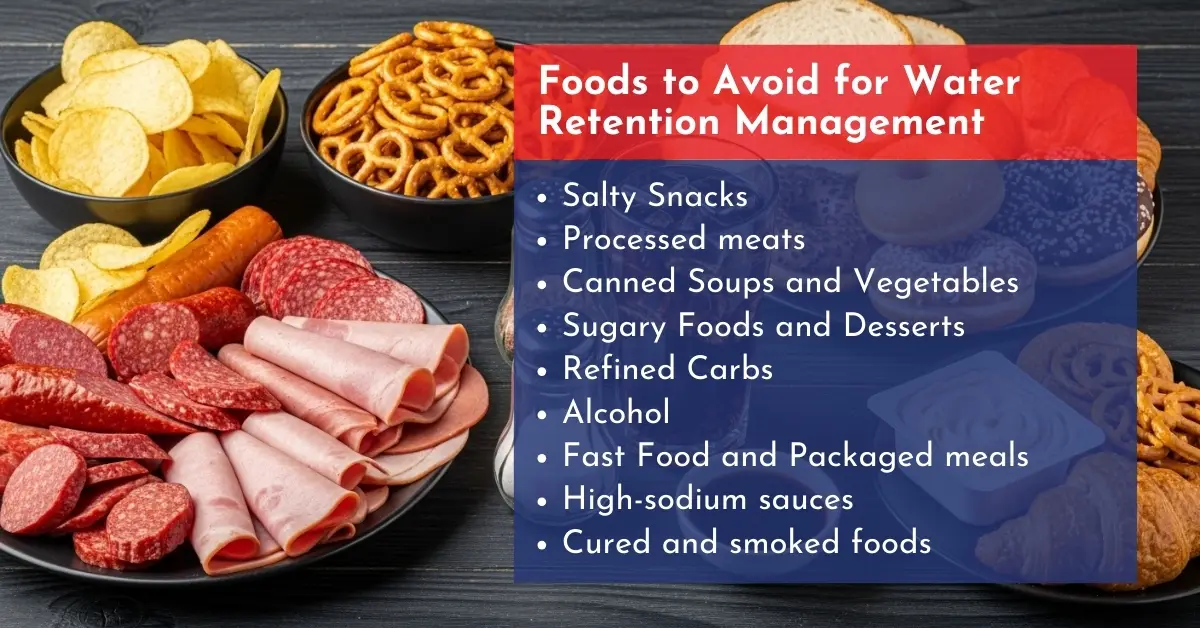
Best Foods That Reduce Water Retention
Shift to positive options. Foods that reduce water retention include natural diuretics.
1. Potassium-Rich Foods
Bananas, spinach, and avocados counter sodium with 400-500 mg of potassium each. Healthline confirms they support fluid balance.
- Bananas (422 mg)
- Spinach (558 mg)
- Avocados (708 mg)
Potassium Foods and Benefits:
| Food | Potassium (mg/serving) | Benefit |
| Banana | 422 | Balances sodium |
| Spinach | 558 | Reduces edema |
| Avocado | 708 | Supports kidneys |
2. Natural Diuretic Foods
- Celery, cucumber, parsley, ginger support fluid elimination. Eat 2-3 servings daily.
- Berries and leafy greens lower inflammation.
- Watermelon and cucumbers hydrate without swelling.
Tips to Reduce Water Retention
- Drink adequate water to improve kidney excretion.
- Poor sleep raises cortisol, so aim to sleep 7-9 hours daily.
- Stress raises the insulin and swelling. Practice to be relaxed, like doing yoga, exercise, and walking.
- Limit the alcohol consumption
- Don’t sit for long hours. Walk 1 to 2 hours to improve blood flow
- Regular movement, elevate feet for leg swelling.
- Monitor total sodium intake (≤2300 mg/day or per doctor’s advice).
- Maintain protein intake to retain fluid in vessels rather than tissues.
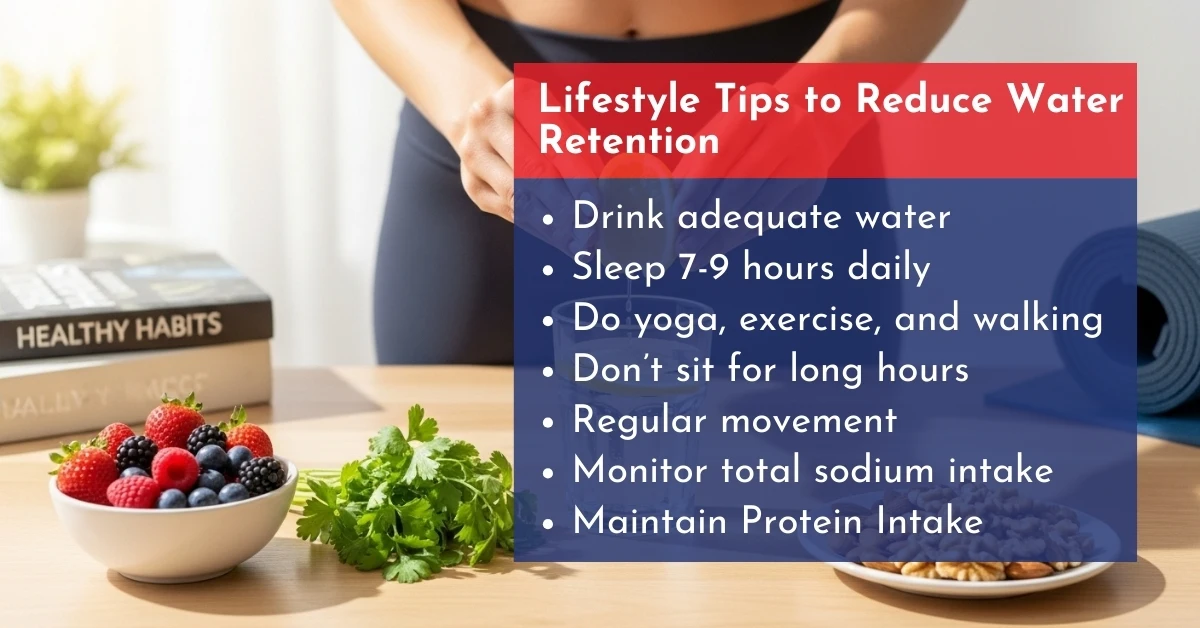
Diet and Edema in Health Conditions
Edema is tied to high blood pressure, where sodium raises vascular pressure.
- Hypertension: Sodium raises blood pressure; patients can monitor with Omron BP Monitors from CGM monitors.
- Kidney disease: Processed foods worsen fluid overload; sodium restriction is essential.
- Diabetes: Monitor sugar with CGMs (Dexcom, FreeStyle Libre).
- Insulin Pump Users: Stable diet using Omnipod 5 or MiniMed pumps is necessary.
- Compression Therapy: Bio Compression garments can help with leg edema.
Conclusion
A wide range of foods that cause water retention highlights actionable changes. Some foods that cause water retention are salty snacks, processed meats, canned foods, sugary treats, and fast food. If you skip these foods, with potassium-rich fruits, vegetables, whole grains, and natural diuretics. These foods reduce swelling and are good for your health. When you use the right medical tools and follow a healthy diet, you will recover soon. The medical tools from CGM monitors can reduce swelling, improve comfort, and promote long-term health. When you use or change the medical devices, always consult your doctor.
Frequently Asked Questions
What is the biggest cause of water retention?
The most common cause is eating too much salt. High sodium makes your body hold extra fluid, leading to swelling in the hands, feet, and ankles.
How to flush out water retention fast?
Drink more water, eat potassium-rich foods like bananas and spinach, cut down salt, and stay active. These steps help the kidneys release extra fluid quickly.
What foods reduce water retention?
Foods high in potassium, like avocados, spinach, and bananas, balance sodium. Natural diuretics such as cucumber, watermelon, and celery also reduce bloating and swelling.
Does sweet potato cause water retention?
No, sweet potatoes do not cause water retention. They are rich in potassium, which helps balance sodium and may actually reduce swelling and fluid buildup.
Which fruit is the most diuretic?
Watermelon is the most hydrating and naturally diuretic fruit. Its high water content and minerals help the body flush excess salt and fluid efficiently.
What drinks get rid of water retention?
Water, herbal teas like dandelion or green tea, and lemon water help flush out sodium. Avoid soda and alcohol, which worsen bloating and swelling.
When should you see a doctor for water retention?
If swelling is sudden, painful, linked with chest pain, shortness of breath, or kidney, heart, or liver disease, seek medical care immediately.
Disclaimer:
This article is for educational purposes only and is not a substitute for medical advice. Always consult your doctor before making dietary or treatment changes.

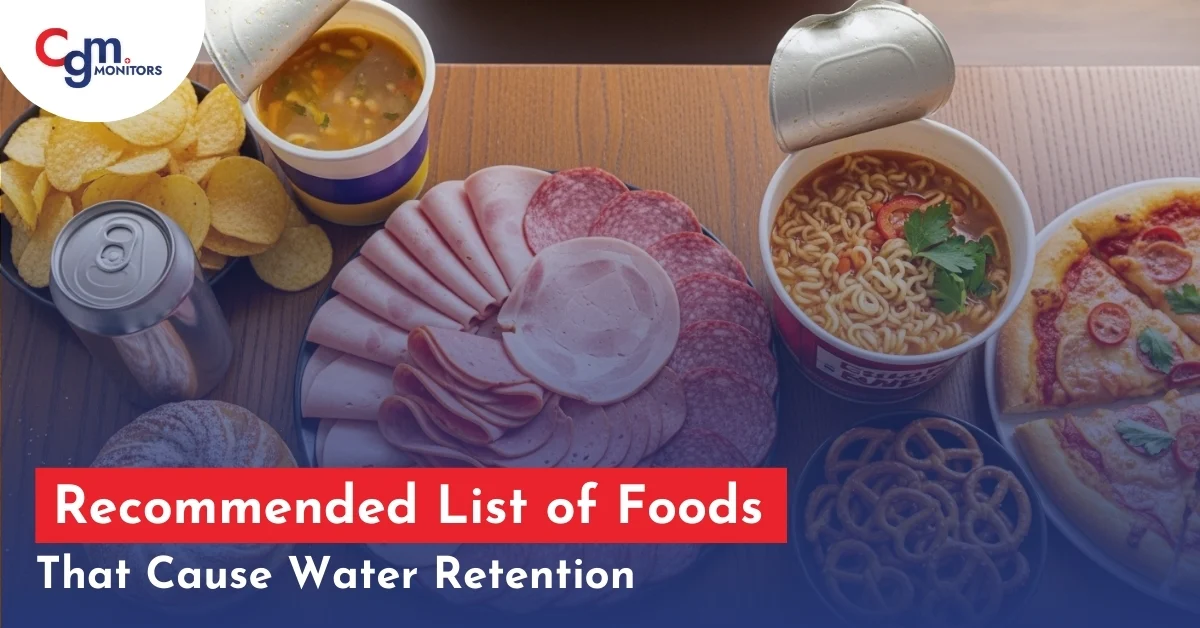
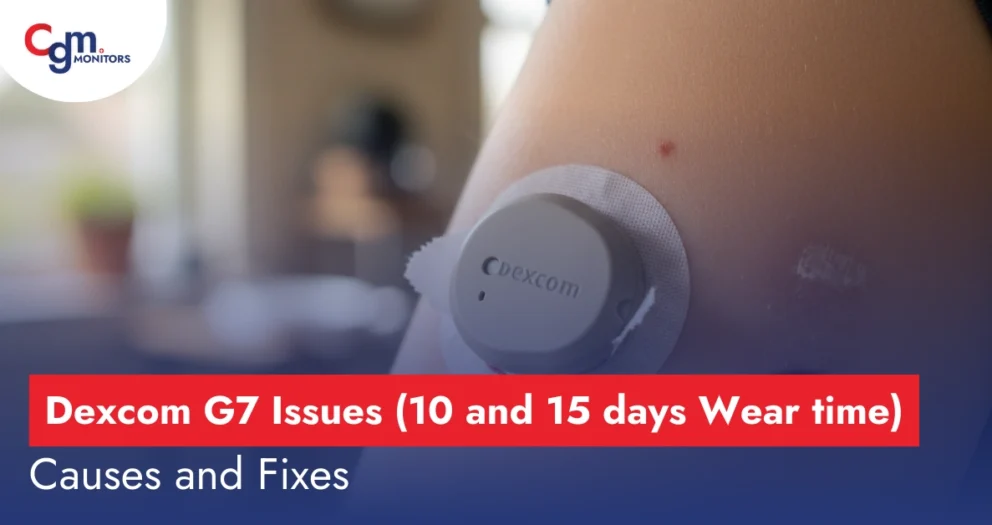

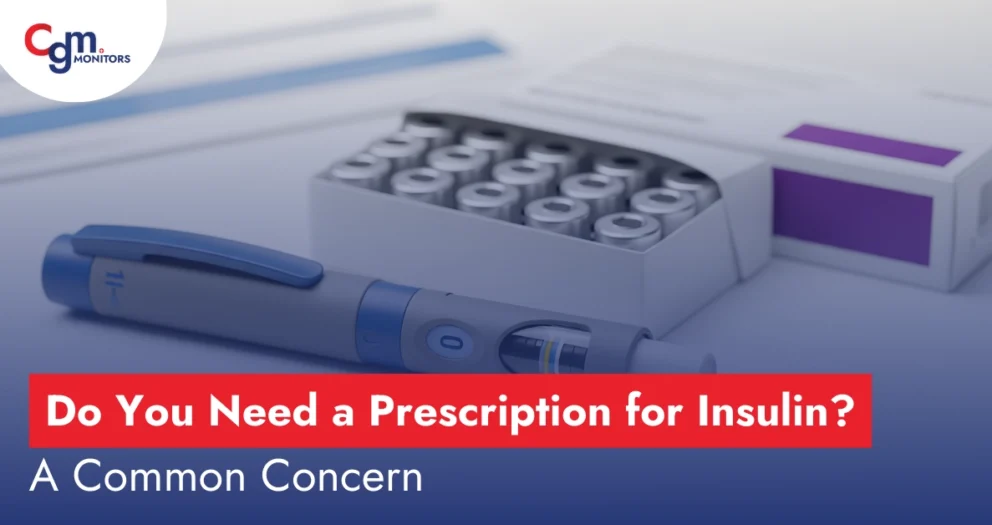


Write a comment
Your email address will not be published. All fields are required